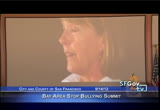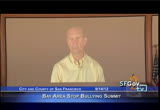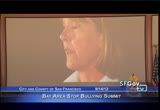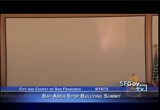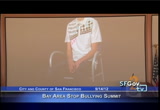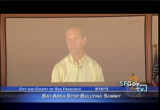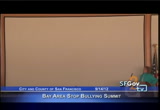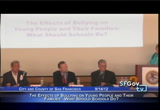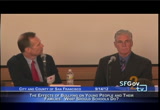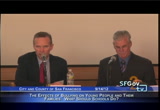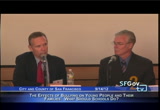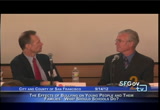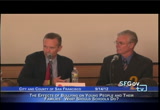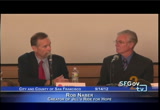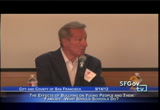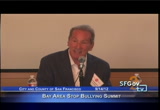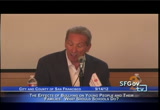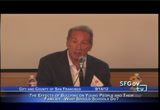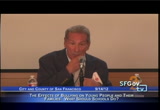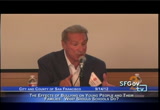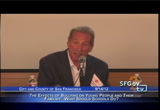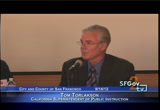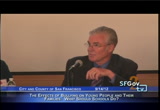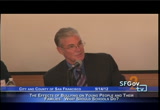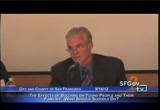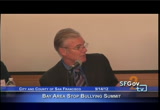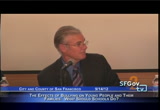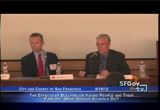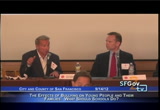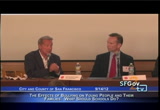tv [untitled] January 26, 2013 1:30am-2:00am PST
1:30 am
1:31 am
said, i don't know how to tell you this, but i think there's so much going on. >> she told us her son had come to her and told her there was a picture jill had sent to him in december naked in her body and it had been passed to another boy and then to another boy and put up on the internet. >> he told me he had these pictures of jill and he was telling everybody that they were on his email account. so everybody went on the email account and they saw and they sent them to themselves just to have them just to, i don't know, just to --. >> we were very surprised when she told us about the picture. we had no idea. jill was very private, we couldn't understand
1:32 am
why she would send something like that to a boy that she wasn't a boyfriend, it was just a friend. >> our first thought, this isn't true. we first thought this can't be true. then i thought, i need to at least know, i need to at least pursue this and bring it to the attention of the police department. >> we started talking a lot in, like, december. that's when i asked for the pictures, i showed my friend, i didn't send it to him, i just showed it to him. like a month passed by, like a month and a half, no one knew about the picture and stuff. >> i honestly don't think anyone had the intention of embarrassing her. i think they just wanted, oh, check it out, top dog, i got so and so's naked, check it out. i would only think it was for popularity, not malicious intent. >> people were talking about how it went from one person to
1:33 am
another and then went on the internet. >> one week prior to her committing suicide she was very, very much on her mind that she was troubled about the picture and how far it had gone and how many people were seeing the picture. she was texting friends that she was going to commit suicide, she might as well commit suicide. >> i think i should have known the police would get involved but i didn't think about it until, you know, i got called in or 4 police officers standing there, like, bringing me into a conference room, interrogating me about it. i was just, it was one of the scariest things i've ever had to do. that's when it hit me, oh, my god, we're in trouble. >> later we heard from a police officer little pieces of information that this was --
1:34 am
actually happened and he had interviewed several kids at the high school who were in jill's class jill had known and compared stories and the information about the picture, the picture had gone to boy a, who sent to boy b who sent it to boy c who posted it on the internet. >> their reason for coming was possession of child pornography. >> i'm telling this story primarily to get the idea axraus to other parents and kids that they really need to look past just a reputation, but need to look at their character. if any of those boys had just pressed delete, we wouldn't be having this conversation. >> other parents should be aware that this is happening and it's not -- it's all over the world, it's not just in our
1:35 am
neighborhood. and talk with your children and teens about the subject and get educated on the subject yourself so you can learn how it handle it and really talk to your children about it can be fun, it can be dangerous, these new toys that we have. >> wow. all right, i'd like to introduce the members of our panel today, rob is here, rob, could you come on up, rob neighbor, please join us.
1:36 am
thank you so much for being here. (applause). >> assembly tom ammiano is here. (applause). >> and our state school chief tom torlichman is here and he is making his way to the podium. thank you all for being here. rob, i want to start with you. you are a los gatos man. how old was jill when this started happening. >> it started happening when jill was about 14, it started in december, she turned 15 in february and then less than a month later, she passed. >> i can't even imagine what that was like for you all. you have another daughter so you
1:37 am
just couldn't fold so how did you deal with all that? >> that's one of the greatest challenges. you know, the devastation that jill went through, the pain, doesn't stop. families will testify it continues. it hits the community and now we have to continue to pull ourselves up and help our other daughter and the challenges of raising and parenting another child. you know, we can't just pull up in a shell. she has the right to have a childhood. she deserves to go to go to college. she deserves to be happy. we need to teach her and show and parent her to help her. >> this happened in 2009 and it made the news, it was just a horrible thing for everybody to experience. at what point did you all find the strength to pull yourselves out of what you were going through, your immediate grief, and do something about it, do something about -- speak up
1:38 am
about it? >> it was a good year. i mean obviously parents can testify that first xwreer is just a blur of, you know, smoke and mirrors. nothing is real, ups or downs, but the seasons are not supposed to be in disorder. children do not pass before their parents. we began to see that the school, the high school in los gatos, led by a very strong, great principled people, brought in an organization to help and after all i should preface in 2009 was a brutal year for los gatos high school, they lost two other students shortly before jill died. the school and principal brought in a counseling group called cassie, counseling and support services for youth, embedded counseling. and their job was to change the culture, very much what we've heard today,
1:39 am
change the culture to get rid of the stigma of mental health and understanding that a lot of these kids feel anxiety and stress, they need someone to talk to. they just don't have the perspective that an adult has. >> one of the things that struck me was the boys were interviewed, they knew they were in trouble, but i didn't hear them say i'm sorry, i shouldn't have sent the picture on. >> the three boys were arrested and they complied with a vuft stis program and part of that program was to write a letter to jill apologizing. as one could expect there is a spectrum of responses. some were very, very sincere. some were more concerned that they were caught. they were asked to be part of
1:40 am
this video today, it was critical they were involved. i think what is interesting you catch the quote, while i'm the big dog, i got someone naked. i just want to point, that's the culture that was going on, that jill was a possession, a baseball card or a dollar bill. >> has that culture changed? >> yes, i think cassie is doing a great job at that, a great job, but what we need to do is keep -- jill would have graduated this june. her class now is gone. what we need to do is keep this going. >> one of the things everyone is wrestling with, we want to know what we can do today, right now, when we go home. she was a good girl, you said she was a good girl, but she couldn't talk about this, she couldn't tell you what happened and her friends were being texted that she might commit suicide and they did nothing. so how did you move forward from that? how can we change that? >> again, that's this culture. it's the ability to talk to
1:41 am
our parents, as my wife polly did such a great job on the video, you need to look and check your kids' browser. i understand you need this phone, i understand you need this computer, but i get the rights and privileges to check the browser. trust and verify. it's communication and throwing that communication far out ahead to bring this up and say, you know, we got to talk about these things. i hear about sexting, i hear about kids committing suicide, we naed to talk about it. have you thought about hurting yourself? >> is that hard for parents to do, to say those words? >> absolutely. as a parent i would think i'm going to place the thought in my child's mind. studies show 50 percent of high school students have ideation of suicide. 50
1:42 am
percent. >> you have been an advocate now. as hard as this journey has been for you and your wife, it's been several years, how is the community responding to you all. >> it's amazing, 43 months, 3 days. we look at it, keeps going -- the community has been very responsive. very helpful. we have devised and we created a fund raiser called jill's right for hope. we've held this, it's a fund raiser for cassie in memory of jill. the people in our community to be there and understand the cause to support cassie and how important it is to be there for kids, now not only are they in the high school for 4 years, they have just entered the feeder middle school for another 3 years. that's 7 years that kids will have free mental health care to change
1:43 am
the culture. that's 21,000 lives. that also includes the faculty, think of the devastation that occurs to the faculty and the parents that's all provided to this change of culture. >> can we find this online? >> absolutely. cassiebear area.org. jill's ride for hope we just finished, we had a great ride the end of august, the beginning of school, as you might imagine it's a brutal event. for us it's a great cause but a crappy --. >> you are right. thank you so much. assembly man tom ammiano has his own story about bullying but you are the author of what we've been talking about today. >> it sounds trite, but all politics being personal, you've probably heard that before many times. in the case of this bill, that does ring true. i
1:44 am
was on the bridge board for many years and meeting after meeting parents would come, particularly of teenagers who had jumped, and it was heart breaking and poignant and that feeling of helplessness that we all have, very reminiscent of this story and of your story in terms of what the parents go through and the inaction. and we finally were able to get a suicide deterrent plan and we're looking forward to getting that money authorized soon so that we can start construction. but as a kid in the 50's in newark, new jersey, i was, shall we say, a little fey, a little high strung, my mother used to say. i guess like a moth to the flame attracted all kinds of undesirable attention including from some of the teachers. we had a football/history teacher who just loved
1:45 am
tormenting me, surrounding me with other members of the football team, some who i got to know a little better later, if you understand my drift. the point was there was no place to go. you felt so shamed when you were being bullied or when you were being exposed. i didn't want to talk to my parents, they were hard-working, i didn't want to burden them with that so i kept it inside for a very long time. there's a book out about keeping things inside like your orientation or whatever and they say that when you have ghost wounds. you don't see anything but they are there from that kind of experience. so when i got to a place where i could actually do some kind of beneficial act around this issue of bullying, i listened closely to many of the horror stories that we heard and i thought, i can translate
1:46 am
this into legislation. i think i know how to do that now. i did meet seth's mom and we decided that we would call it seth's law in honor of her, she had been in and around sacramento for a long time. so the legislation in and of itself, i don't think it's going to work miracles, but it is definitely on people's radar now and i think you hear it in the media more and more. the reason we have a suicide barrier and the reason we are having legislation like this is because of the parents and the families because they are the ones that hurt the most and i would imagine part of the therapeutic thing, you've got to tell this story and telling it in the right place and the right time can be very effective. so seth's law does require that if you witness an act of bullying, that you must report
1:47 am
it. >> is that for anybody? >> anyone, but particularly teachers. there is a -- sometimes we see things that aren't very pleasant and if you've ever taken it to muni, you know what i mean. your tendency is to turn away. i heard the word faggot on the play ground when i taught. the teachers were intimidated, they didn't want to be seen to have any empathy because that might reflect on them. it's crazy but that's part of the oppression. when we started to work on the legislation, i tried to channel myself back in the classroom, i taught for a number of years. we're hoping seth's law is the first of many. in addition to their reporting you also have to document, we feel like this is the science of it which, you
1:48 am
know, sounds a little sterile when you consider the emotional loss, but that you document each incident as it happens so you have a record and you also look at the climate, the culture, and also the perpetrator. we have a second piece of legislation that calls for the restoretive justice element that people were talking about with regard to bullying, not just lgbt kids but in general. there was a sect committee this year of men and boys of color and that committee came out with a number of pieces of legislation all based on alerting to more programs, actually codifying the issue and also consequences and solutions and particularly with an accent on looking on is suspension automatic, is
1:49 am
expulsion automatic. cyber bullying, another dimension of all this, the new technology, we're all catching up, there are two, three pieces of legislation that i co-authored, i am not the sponsor, that deals with cyber bullying. i will say the social networking folks have been very cooperative about that. so just, in sum, we have sacramento's intention, ladies and gentlemen, we are waiting for the pope -- i mean the governor it -- to sign these bills. it's a very mechanical things but anything you can do to encourage the govern rr to sign the bills that deal with this issue. unfortunately they are a drop in the bucket, they don't bring seth back or your son or your daughter. we are quite aware of that and i think that's a thought that we always are going to hold in our minds because that will help
1:50 am
influence further legislation. this is a good segue, probably, to mr. torres. we work very well with his department and he's extremely receptive and action-oriented. >> i think that's great that we have so much cooperation with departments in sacramento. that's great to her. go ahead, expand on that. >> thank you to the u.s. attorney for gathering us to the. we have come a long way but as the parents expressed so poignantly, we have so much farther to go. we can pass laws but how do they get enforced, how do they get actualized, how do we have the accountability? more than that, as tony smith was talking about, creating caring climate, a culture of trust and respect. and that's hard and needs to, top down but also bottom up.
1:51 am
i just recently viewed the movie bully and brought back a lot of memories, it brought back a focus on just the cruel course of bullying and the insensitivity, the interviews with administrators and school personnel. i don't know if any of you have seen the movie or a preview of it, it's just an appalling, republic prehence sibl, the ignorance . my beloved niece took her own life a couple miles from here. she
1:52 am
was a special needs child and it's hard to know what happened, but this story of grief and then the turn around in the movie was really positive because it emphasized the positive that was coming out of the tragedy. so for rob and for the mom over here who grieves, you have the idea i am somebody. in the movie there's tee shirts, i am somebody, everything starts with one. we got to go from here forward and replacing hate with hope. so those were good themes that came out of that movie. the department of education, we're overseeing 6.3 million students' lives for a great part of their life as a young person they are in school. how do we create the climate as tony was speaking about,
1:53 am
richard carenza, how do you get down to the locker room level, the football field level, how do you deal with it on campus. the state has a training program on bullying sensitivity and bullying, we're one of the few state training programs in the nation. budgets are tight and to implement the new laws as tom has taken leadership to really spearhead that change, we're going to need some resources, we're going it look to foundations and reach into budgets, how do we materialize the reality of those changes that are needd? so we have some ideas, we're going to do a survey of all the school districts, there's a thousand school districts, 10,000 schools, we're going to ask the schools do you have an anti-bullying policy? they are supposed to have, a new law was just passed saying you should
1:54 am
have an anti-bullying policy as part of your safety plan? have they done it? sort of a gentle reminder this is important, in the midst of crazy budgets and real chaos due to the bad economy and some of the massive cuts the schools have endured, this is so important because a student can't learn, we know, a student can't learn if they are fearful. they will skip school, they will not come or when they are there they are not able to concentrate and learn. so a school safety environment is no. 1 and we know that when you have that safe environment it's backed up by respect and trust, students will learn better, they will attend school better and academically they will do well and socially they will do well. so socially we're very concerned about implementing at the ground level these laws tom has led the way in enacting. >> but there are a lot of people who don't think this is an issue, unfortunately, sadly. i know you are a big believer
1:55 am
in this in mental health and good physical health and the link to academics. could you talk about that, please? >> all the research points to having a healthy school environment, having health in your life, many students, a quarter of our students in california have poverty, a quarter of our children have no health care. what was a million students a year and a half ago is now a million and a half. when you have good nutrition and good health, you will learn better. it goes hand in hand with good mental health and a good school environment. the research points out, we want our kids to succeed and if we're going to do that we have to deal with bullying as part of a larger issue of health and safety in our schools. >> of all the issues in our schools, i know budget is a big one but where would you place bullying in terms of crisis of
1:56 am
priorities. >> we have a team out here in the audience from law enforcement to school councilors to teachers. it's in the top 5 or 6 areas that we have to really address. if you take budget aside, put that out there as an overwhelming need, it's really, the very top priority is that public safety and bullying is an important set of that number of concerns. >> have you heard about some really horrible cases of bullying in the schools? have those cases come to you? >> some of them have. of course reading, having the interaction with tom as a legislator, we're good friends and he has spearheaded taking the personal from the families' perspective and his own experiences and targeted it toward legislation. there's far too much of it. part of the training, the law that was passed talks about school
1:57 am
personnel reporting but doesn't cover volunteers. how do we reach out to make sure the campus volunteers are also trained? how do we have the victims find a way to be brave enough to report it, that they are being bullied and to talk to some trusted adult about that. >> and see those things don't cost money. one gets very artful, as the former senator knows, when you good out before appropriations, the committee where everything dies. because there's a price tag, i feel like minnie pearl that i have a little price tag on the bill. we did informal surveys and found a lot of schools had programs. these things are mostly codifying something or alerting the principal and in that way you can deal with the
1:58 am
budget monster. and then people -- this is so much on the radar -- you have i guess it's a good thing, you have members who never would have dealt with this competing for who could be the biggest anti-bully person. and that's good. i mean it's healthy. but the other thing is we get all this feedback either through email or, gee, seth's law is not being enforced yet in my district, what's the story? so then we call up and find out, well, the bill just went into effect 3 days ago or something, but at least there's this back and forth now which i also think is very healthy. so you have the investment of the constituents and they have a focus i haven't seen in a long time around many issues. so we will experience that success and won't have to affect the state economically,
1:59 am
but as always when you are in crisis you want it taken care of right then and there. i think we're moving faster than the usual glacial pace in sacramento. >> isn't there a learning curve, now you have the new law in place, you have to get that to the teachers, you have to get that to law enforcement, everybody has to know about it. >> there's quite a few things in the community that are already happening. if you can bring everyone together, you know, it's almost like with teachers and we used to call it in servicing, a lot of people think you wouldn't want to go to an in service. teachers are always hungry for stuff. i believe in the law enforcement community and the other convenient tues we're talking about, they are already there. they got the itch. with some leadership from the community or a faith organization or a parent i
70 Views
IN COLLECTIONS
SFGTV2: San Francisco Government Television Television Archive
Television Archive  Television Archive News Search Service
Television Archive News Search Service 
Uploaded by TV Archive on

 Live Music Archive
Live Music Archive Librivox Free Audio
Librivox Free Audio Metropolitan Museum
Metropolitan Museum Cleveland Museum of Art
Cleveland Museum of Art Internet Arcade
Internet Arcade Console Living Room
Console Living Room Open Library
Open Library American Libraries
American Libraries TV News
TV News Understanding 9/11
Understanding 9/11